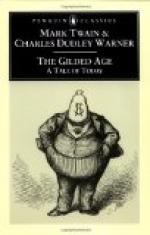Still Philip felt that if he was going to make either reputation or money as an engineer, he had a great deal of hard study before him, and it is to his credit that he did not shrink from it. While Harry was in Washington dancing attendance upon the national legislature and making the acquaintance of the vast lobby that encircled it, Philip devoted himself day and night, with an energy and a concentration he was capable of, to the learning and theory of his profession, and to the science of railroad building. He wrote some papers at this time for the “Plow, the Loom and the Anvil,” upon the strength of materials, and especially upon bridge-building, which attracted considerable attention, and were copied into the English “Practical Magazine.” They served at any rate to raise Philip in the opinion of his friends the contractors, for practical men have a certain superstitious estimation of ability with the pen, and though they may a little despise the talent, they are quite ready to make use of it.
Philip sent copies of his performances to Ruth’s father and to other gentlemen whose good opinion he coveted, but he did not rest upon his laurels. Indeed, so diligently had he applied himself, that when it came time for him to return to the West, he felt himself, at least in theory, competent to take charge of a division in the field.
CHAPTER XXIV.
The capital of the Great Republic was a new world to country-bred Washington Hawkins. St. Louis was a greater city, but its floating. population did not hail from great distances, and so it had the general family aspect of the permanent population; but Washington gathered its people from the four winds of heaven, and so the manners, the faces and the fashions there, presented a variety that was infinite. Washington had never been in “society” in St. Louis, and he knew nothing of the ways of its wealthier citizens and had never inspected one of their dwellings. Consequently, everything in the nature of modern fashion and grandeur was a new and wonderful revelation to him.
Washington is an interesting city to any of us. It seems to become more and more interesting the oftener we visit it. Perhaps the reader has never been there? Very well. You arrive either at night, rather too late to do anything or see anything until morning, or you arrive so early in the morning that you consider it best to go to your hotel and sleep an hour or two while the sun bothers along over the Atlantic. You cannot well arrive at a pleasant intermediate hour, because the railway corporation that keeps the keys of the only door that leads into the town or out of it take care of that. You arrive in tolerably good spirits, because it is only thirty-eight miles from Baltimore to the capital, and so you have only been insulted three times (provided you are not in a sleeping car—the average is higher there): once when you renewed your ticket after stopping over in Baltimore, once when you were about to enter the “ladies’ car” without knowing it was a lady’s car, and once When you asked the conductor at what hour you would reach Washington.




